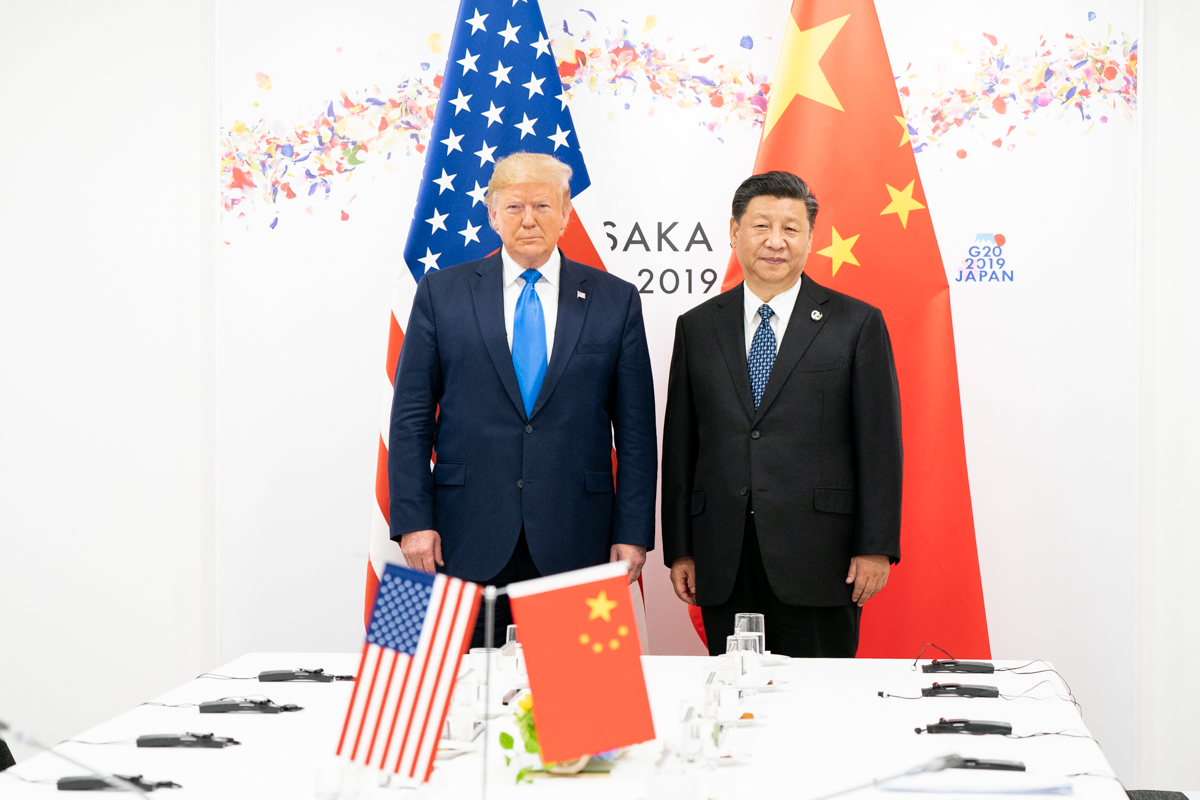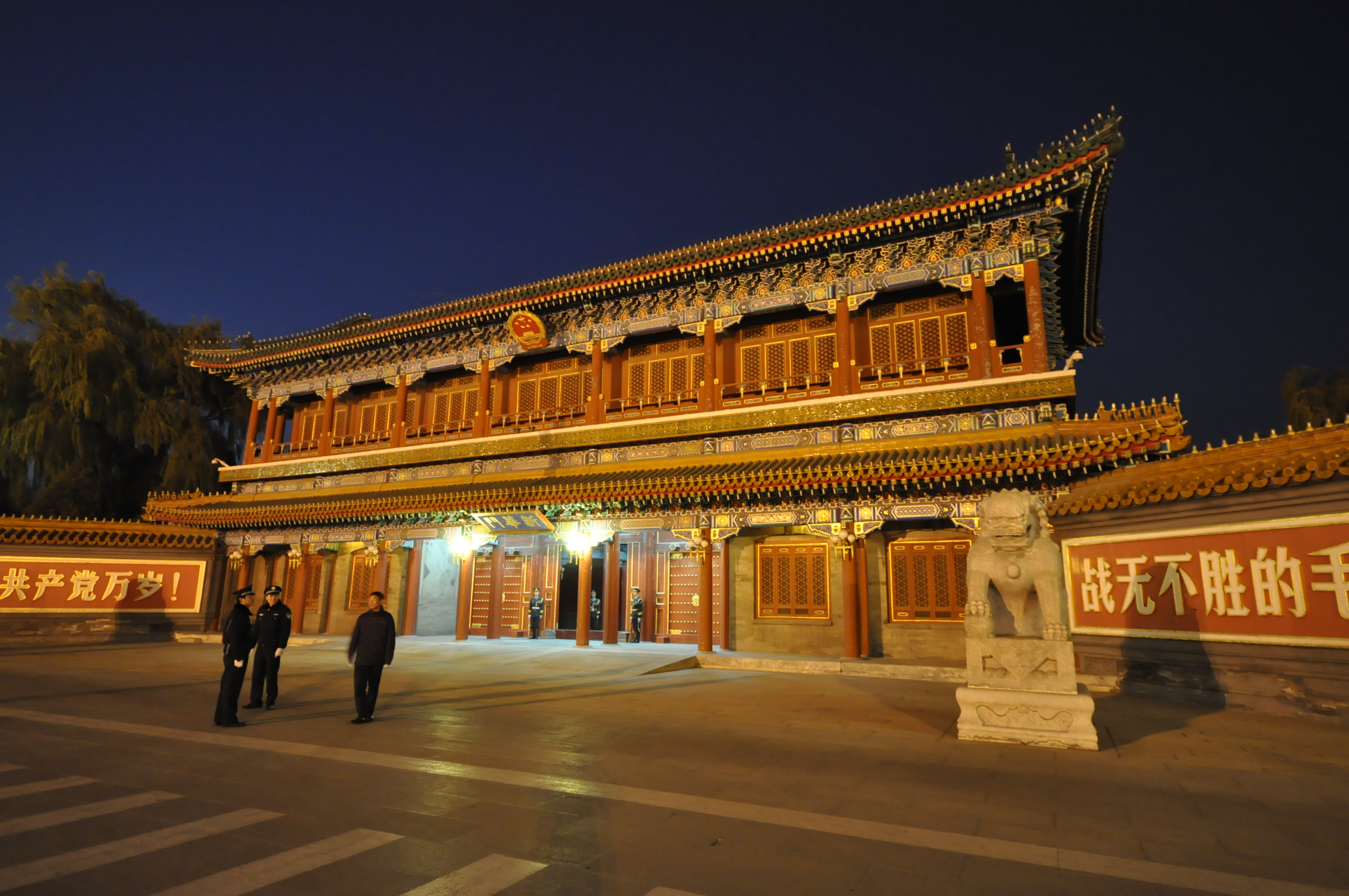Trump Signs Ban on TikTok, WeChat; U.S. Officials Report Chinese Election Interference
Lawfare's biweekly roundup of U.S.-China technology policy and national security news.

Published by The Lawfare Institute
in Cooperation With

Citing national security concerns, President Trump on August 6th signed twin executive orders prohibiting U.S. businesses or entities subject to U.S. jurisdiction from performing transactions with TikTok and WeChat, two popular Chinese mobile apps, after a 45-day grace period.
The news comes as Bytedance, the Chinese social media firm that owns TikTok, has entered negotiations with Microsoft and other firms to sell off portions of their business (U.S. operations, among other things) that would likely be affected by the ban. By contrast, Tencent, the Chinese tech titan that owns WeChat, has no plans to divest or sell their app, which has become integral to hundreds of millions of users in China and among the Chinese diaspora. If implemented, the order against WeChat could depress sales in China for U.S. technology firms including Apple, whose products carry the app. Analysts also assess that Beijing may retaliate against the United States by targeting U.S. firms in China.
The President’s executive order on TikTok states that the app, which has been downloaded some 175 million times in the United States, could give the Chinese Communist Party (CCP) “access to Americans’ personal and proprietary information — potentially allowing China to track the locations of Federal employees and contractors, build dossiers of personal information for blackmail, and conduct corporate espionage.” The order also states that the app could be used for “disinformation campaigns that benefit the Chinese Communist Party,” and cites unnamed “conspiracy theories” that spread on the app concerning the origins of the coronavirus.
The President’s executive order made no mention of a longstanding national security probe into TikTok conducted by the Committee on Foreign Investment in the United States (CFIUS), the interagency group has investigated the app over data privacy and censorship concerns. But in a letter to employees, Zhang Yiming, founder and CEO of Bytedance, said that CFIUS had determined that the company would need to divest its U.S. assets.
The President’s nearly-identical executive order on WeChat said that the messaging service “automatically captures vast swaths of information from its users…[and].... allow[s] the Chinese Communist Party access to Americans’ personal and proprietary information.” While WeChat is used widely in China, it has limited market penetration in the United States.
In issuing the orders, the President cited his authority to address national security concerns pursuant to the International Emergency Economic Powers Act (IEEPA). IEEPA gives the President wide-ranging authority to impose economic restrictions—including blocking trade with certain businesses or countries—after declaring a “national emergency.” In an executive order issued in May of 2019 ahead of U.S. sanctions on Huawei, President Trump had already declared a national emergency based on his finding that “foreign adversaries are increasingly creating and exploiting vulnerabilities in information and communications technology and services.” He pointed to that same national emergency declaration in issuing his orders concerning WeChat and TikTok.
Under the National Emergencies Act, the President has complete discretion to declare a national emergency, so long as she issues public updates before invoking additional powers authorized by the declared emergency. Analysts have noted that presidents have used their broad authority liberally: at the moment, some 30 national emergencies are concurrently in effect, giving President Trump broad authority under IEEPA and more than 120 other statutes. In August 2019, President Trump threatened to invoke the act to require U.S. businesses to leave China. He has previously invoked the IEEPA in his “maximum pressure” campaign against Iran and in his campaign to remove Venezuelan strongman Nicholas Maduro from power.
Intelligence Officials Report on China’s Efforts to Influence the U.S. Election
In recent days, American intelligence officials have reported that China is making efforts to sway the U.S. presidential election in November. On July 24, an official at the National Counterintelligence and Security Center (NCSC), an arm of the Office of the Director of National Intelligence, announced that China, Iran and Russia were “expanding” their “influence operations” ahead of the election. The center provided more detail on August 7, reporting that China desires Joe Biden to prevail over President Trump this fall. Just two days later, National Security Advisor Robert O’Brien commented that China has launched cyberattacks against U.S. election infrastructure. These remarks went beyond the center’s latest report, which detailed the CCP’s preference for Biden but did not specifically allege Chinese hacking operations.
According to the center’s latest statement, China opposes Trump because it believes that he is “unpredictable,” and that Trump’s reelection could restrict China’s geopolitical goals. The report also indicated that China’s influence strategy has included stepping up public criticism of Trump administration policies—including its COVID-19 response, actions on Hong Kong and stance on the South China Sea. The Chinese government “recognizes,” the report states, that these criticisms “might affect the presidential race.” And according to O’Brien, China is conducting its influence operations by leveraging social media platforms including TikTok and Twitter. However, NCSC officer William Evanina stated that China—as well as Iran and Russia—could not easily interfere with U.S. elections at a large scale.
Most of the details behind these reports remain classified, yet the reports have already attracted a range of responses from U.S. political leaders. Some officials, reportedly, have expressed doubt about O’Brien’s claim that China has engaged in cyberattacks. Others have sought to differentiate China’s operations from Russia’s, which some officials argue are more pervasive and of a different character. Democratic Speaker Nancy Pelosi, for instance, has emphasized that the election-interference threat from China is less serious than that from Russia. By contrast, others lawmakers caution that the recent reports downplay the threats from China, Russia, and Iran. Democratic Senator Richard Blumenthal, a member of the Senate Intelligence Committee, called for declassifying the intelligence on all three countries’ election interference, which he described as “chilling.” Republicans, meanwhile, have pressured Trump since last month to investigate potential Chinese election interference conducted through TikTok.
American officials have long criticized China for its cyber operations against the United States. But tensions surrounding Chinese cyberattacks have escalated this year—a trend that these latest intelligence reports will likely exacerbate. In a speech last month, FBI Director Christopher Wray excoriated China for its cyber campaigns aimed at stealing U.S. intellectual property. Last month the United States indicted two Chinese nationals for allegedly hacking coronavirus research centers in Texas; the Trump administration also shuttered Houston’s Chinese consulate in response to that incident. Earlier this year, Trump officials also charged members of the Chinese military for a 2017 breach of credit-reporting agency Equifax—an operation that compromised personal data of almost 150 million Americans. The Chinese government has consistently denied hacking U.S. companies, citizens or infrastructure.
These developments accompany a widening schism between the United States and China on tech and a host of other issues. It remains unclear whether reports of election interference could push President Trump to consider further restrictions on Chinese technology companies. For its part, China has harshly condemned U.S. actions on TikTok and WeChat, and in recent weeks it has persistently railed against a host of Trump’s other stances on China—as the NCSC report observes. In response to the Trump administration’s latest accusations of election interference, China’s Foreign Ministry spokesperson insisted that “the general election of the United States is its internal affair and China has never interfered in it and has no interest to do that in the future.”
Other News
On August 9, Hong Kong police arrested Jimmy Lai, a pro-democracy media mogul, for violating Beijing’s new national security law targeting Hong Kong. The new law criminalizes “secession, subversion, terrorist activities, and collusion with a foreign country.” The same day, the police also arrested other executives at Lai’s NextDigital, which publishes the widely distributed pro-democracy paper, Apple Daily. Hundreds of police raided Lai’s offices, in a scene that analysts say demonstrates the extent to which Hong Kong’s national security law has transformed a city once celebrated for allowing freedom of expression under the “one country, two systems” model set forth in Hong Kong’s Basic Law.
On August 8, the United States imposed sanctions on Hong Kong Chief Executive Carrie Lam and other Hong Kong officials for “undermining Hong Kong’s autonomy and restricting the freedom of expression or assembly of the citizens of Hong Kong.” The sanctions target Chinese officials responsible for implementing Beijing’s national security law. China responded to the U.S. move by sanctioning U.S. officials, including Senators Marco Rubio, Ted Cruz, Tom Cotton and Pat Toomey and Congressman Chris Smith.
U.S. Health and Human Services Secretary Alex Azar paid a formal visit to Taiwan, marking the highest-level American visit to Taiwan since the U.S. severed formal diplomatic relations with the island in 1979. Azar said that he had previously sought to secure Taiwan’s reentry into the World Health Assembly, the convening body of the WHO, but added that “the Chinese Communist Party and the World Health Organization have prevented that.” The secretary also praised the island’s response to COVID-19. During the visit, the Chinese People’s Liberation Army Air Force flew fighter jets through the narrow and sensitive strait separating China and Taiwan. The jets briefly crossed the median line and entered the Taiwanese section of the strait, marking the third time Chinese Air Force jets have done so since 2016.
Commentary
The New York Times editorial board explores the arrest of Jimmy Lai in Hong Kong, arguing that China’s national security law erodes both the city’s freedoms and China’s standing on the global stage. In Foreign Affairs, Michael McFaul faults Trump officials for conflating U.S.-China competition with Cold War rivalry, while Kevin Rudd discusses how to prevent tensions between the United States and China from leading to armed conflict. In the Washington Post, Katrina vanden Heuvel calls for a renewed debate in American politics, across party lines, to explore productive ways of engaging with China.
In the Wall Street Journal, Marsha Blackburn criticizes the National Basketball Association for building its footprint in China while turning a blind eye toward abuses in Xinjiang. In the Diplomat, John Lee questions how much U.S. tech restrictions can slow the development and global spread of Chinese 5G technology. Writing for the Center for Strategic and International Studies, Claire Reade argues that trade could prove to be a stabilizing factor in U.S.-China relations in the near term. At CNBC, Frederick Kempe writes that U.S.-China tensions are becoming more fraught—and perilous—than ever before.
Writing for Lawfare, Jim Dempsey examines the broader geopolitical strategy behind Trump’s bans of WeChat and TikTok. Bobby Chesney provides a primer on the legal and security issues implicated by President Trump’s executive orders banning the two Chinese apps. Jonathan G. Odom discusses how the international community should respond to Chinese gamesmanship regarding the U.N. Convention on the Law of the Sea—and in the South China sea generally. Elena Chachko explains how Trump’s WeChat and TikTok could attract judicial scrutiny of presidential emergency powers. Arindrajit Basu and Justin Sherman analyze the prospects of burgeoning coalitions of democratic nations on 5G technology and artificial intelligence. Jordan Schneider unpacks whether Chinese leadership should prefer a Biden presidency over a second Trump term. Colin P. Clarke and Mollie Saltskog explore the prospects for a burgeoning Sino-Iranian strategic partnership. Justin Sherman argues that barriers many countries have erected against Huawei’s stem more from domestic factors than the U.S. campaign against the company.



-final.png?sfvrsn=b70826ae_3)


